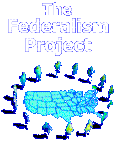|
|
Environmental Federalism? State Activism on Cleaning the Air May
2003 Federalism Project Panel
For most of the environmental era, business groups
(seconded by many economists) criticized environmental regulation as
overly centralized and rigid. Environmental advocates, for their part,
insisted on tough national regulation as the only means of remedying
pollution that crosses state boundaries and of preventing a "race
to the bottom" among the states. In recent years, however, states
have come to "think globally" and "act locally."
Even on issues that plainly transcend state and even national
boundaries, such as air pollution and global warming, many states have
taken measures far in excess of federal requirements. This marked
shift has forced scholars, business groups, and environmentalists to
reexamine their positions and strategies. A Federalism Project panel recently reviewed state
activities on such issues as global warming, power plant permitting,
and car emission standards. Panelists discussed the desirable role and
scope of national, state, and local regulation and the need, if any,
for legal and regulatory reforms. Featured speakers: Robert Gasaway, Kirkland & Ellis Michael Greve, Federalism Project Marlo Lewis, Competitive Enterprise Institute Barry Rabe, University of Michigan Christopher Schroeder, Duke Law School
|


